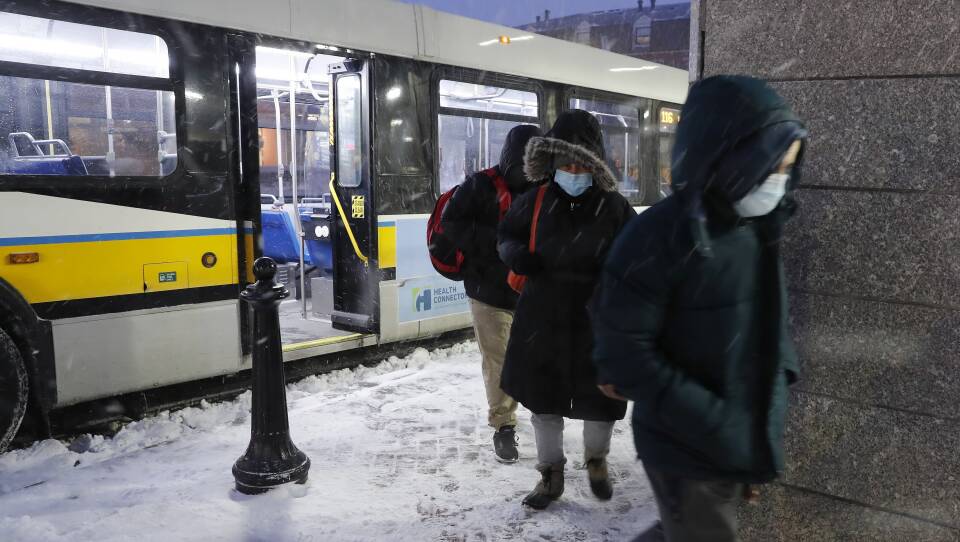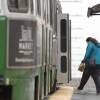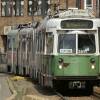Days before Boston is set to expand its fare-free bus program, the MBTA shared preliminary data that indicates the existing effort is not helping many riders in need.
Eliminating fares on the Route 28 bus increased ridership and decreased travel times, but most riders did not save any money as a result of the pilot. At the urging of transit advocates and their riders, the MBTA’s Board of Directors is now actively considering more options to reduce the cost of transit, including reduced fares for low-income adults.
The report states that 66% of riders said they did not receive any financial benefit from the Route 28 fare-free pilot program, which began last August in Boston. That’s because they paid for monthly passes or a fares on connecting subway or bus trips. The only financial beneficiaries were those who rode only the 28 bus: 21% of whom said they saved more than $20 a month, and 12% who saved less than that.
The MBTA said the dramatic 22% increase in ridership on the route was absorbed easily without significant impact on travel times or reliability. In fact, all riders benefited from faster service. Because bus drivers did not have to collect fares, the time they spent at stops was reduced by 20%.
Next Tuesday, Mayor Michelle Wu will add bus routes 23 and 29 to the Boston’s fare-free fleet . All three bus routes will be free to ride for the next two years. The estimated $8 million dollars in lost revenue will be borne by the city of Boston. Mayor Wu has long maintained that public transit is a public good that should be provided by the government.
Communities like Cambridge, Watertown, Brookline and Salem have expressed interested in fare-free buses and are watching Boston’s effort. Although the MBTA said it is open to discussions about further expanding free routes, it does have concerns about equity and the sustainability of municipal funding.
While free buses have been getting the most attention, the other fare change proposal under consideration is the adoption of a low-income, or means-tested, fare system. It's a change transit advocates have long been asking for. One of the Fiscal Management and Control Board's final acts was to instruct agency staff to prepare scenarios of a pilot program to test low-income fares. That information was what was presented to the agency's new Board of Directors this week. But the board did not make a decision on moving forward with the pilot, which has frustrated some transit activists.
Many transit advocates said a low-income fare sytem would be more equitable, beause the help would be targeted to those who truly need it.
For instance, 42% of bus riders and 26% of those who use the subway are considered low-income, but only 7% of commuter rail passengers are. They all would receive the benefit of means-based reduced fares.
“The idea of a low-income fare began for a simple reason: folks were struggling to pay the cost of riding,” said Collique Williams, an organizer with Public Transit Public Good Coalition, convened by Community Labor United, in his testimony to the board. “The fare had gone up in 2012, in 2014, in 2016 and in 2019. People needed some help to pay the fare and some assurance that the spiraling costs would not continue. Then, in 2020, the pandemic hit, bringing new economic hardships and health risks.”
There are many challenges to a means-tested fare system, not the least of which is determining who would qualify. MBTA officials have made it clear they don’t have the resources to determine each riders’ income and would need another agency to help, possibly the Registry of Motor Vehicles or Executive Office of Health and Human Services.
Another concern is financial. An analysis by the T estimated that income-based fares could result in between $28 million and $47 million in lost revenue every year. Administrative and operating costs could add another $65 million, meaning a total impact in the budget of $112 million.
“We are facing significant budgetary challenges starting in fiscal [year] ‘24,” Lynsey Heffernan, deputy general manager of planning and policy, warned at the MBTA Board meeting. “And so, there is some concern about our ability to fund a pilot and obviously fund a full-scale program such as this.”
The MBTA Board made no decision on adopting any specific fare policy but wants to pursue how a means- tested fare could be implemented, and what its impact would be. Looking ahead, the T says it will improve the enrollment process for existing reduced-fare programs for youth, student, senior and disabled riders. It will also work with municipally funded fare-free pilots to learn how they work and affect commuting behavior.








